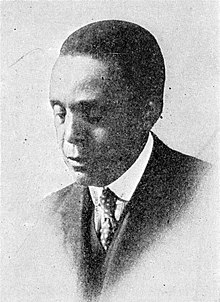George Marion McClellan
| George Marion McClellan | |
|---|---|
 George Marion McClellan circa 1902 | |
| Born | September 29, 1860 Belfast |
| Died | May 17, 1934 New York City |
George Marion McClellan (September 29, 1860 – May 17, 1934) was an American writer. Born in Tennessee, McClellan was educated at Fisk University and Hartford Theological Seminary. He worked as a Congregationalist minister and as a high school teacher and principal. His writing, generally self-published, included both prose and poetry. Critical assessment of McClellan's work is divided. Some see it as unoriginal, while others argue that it reveals emotional depth.
Early life and education[]
George Marion McClellan was born on September 29, 1860, in Belfast, Tennessee,[1] to Eliza (Leonard) and George Fielding McClellan.[2][3]
He received an AB and MA from Fisk University in 1885 and 1890, respectively, and attended Hartford Theological Seminary (now Hartford International University for Religion and Peace) from 1885 to 1887, eventually receiving a bachelor's of divinity in 1891.[1][2]
Career[]

In 1887 McClellan came to Louisville, Kentucky, to work as a Congregationalist minister,[3] later taking a pastoral position in Memphis, Tennessee.[4] Between 1892 and 1894, he worked in New England as a financial agent for Fisk University.[5]
He taught high school and worked as a principal from 1899 to 1919 in Louisville.[3][4]
Poems, McClellan's first book, was published in 1895 by the African Methodist Episcopal Church and financed with McClellan's money.[1]
Old Greenbottom Inn and Other Stories (1906) collects almost all McClellan's prose fiction, including a novella,[6] except a story called "Gabe Yowl".[7] All the stories in the collection are about rural Alabama and, except for one, are about Black women.[8]
Path of Dreams (1916) was published in part to raise funds for McClellan's son Theodore, who contracted tuberculosis.[6] George brought Theodore to Los Angeles, California, to be treated, but he was denied entry to a sanatorium because he was Black and died on January 5, 1917.[6]
His collections of poetry and prose were generally published privately or self-published,[9] although he also published in periodicals.[10] In total, 67 poems by McClellan are known.[11]
Reception[]
Critic Dickson D. Bruce Jr., who considers McClellan's poetry conservative and sentimentalist, notes that it generally treats common themes of the time such as "nature, love, or religion".[1] According to the literary scholar Joan R. Sherman, McClellan's poems illustrate the poetic narrator's "struggle to deal with his 'double consciousness'".[2] In other work, Sherman notes that McClellan "suffered keenly" from double consciousness as a "black artist" who was "highly intelligent, sensitive, ambitious, and race-proud".[11] She describes his work as skillful and measured, while arguing that it evokes "spiritual" dissonance.[11] Sterling Allen Brown "largely dismissed" McClellan's work, viewing it as "the same-old romantic escapism of much of African-American literature".[12]
Personal life[]
McClellan married Mariah Augusta Rabb on October 3, 1888.[13][2] They were probably separated by the 1920s, when McClellan lived in Los Angeles.[14] He died on May 17, 1934, in New York City, and was buried in Louisville.[3]
Publications[]
- Poems and Storiettes (self-published in Nashville, Tennessee, 1895)[15]
- Songs of a Southerner (Boston: Rockwell and Churchell, 1896)[15][16]
- Old Greenbottom Inn and Other Stories (self-published in Louisville, 1906)[15]
- The Path of Dreams (Louisville: Morton, 1916)[15]
Notes[]
- ^ a b c d Bruce Jr., Dickson D. (1986). "George Marion McClellan". In Harris, Trudier (ed.). Dictionary of Literary Biography. Vol. 50. Gale. pp. 206–212. ISBN 0-8103-1728-1. OCLC 13667835.
- ^ a b c d Sherman, Joan R., ed. (1992). African-American Poetry of the Nineteenth Century: An Anthology. University of Illinois Press. pp. 416–417. ISBN 0-252-01917-2. OCLC 24791922.
- ^ a b c d Farrington, Joshua D. (August 28, 2015). Smith, Gerald L.; McDaniel, Karen Cotton; Hardin, John A. (eds.). The Kentucky African American Encyclopedia. University Press of Kentucky. p. 356. ISBN 978-0-8131-6066-5.
- ^ a b Rush, Theressa Gunnels; Fairbanks, Carol; Arata, Esther Spring (1975). Black American Writers Past and Present: A Biographical and Bibliographical Dictionary. Vol. 2. Scarecrow Press. pp. 505–506. ISBN 0-8108-0785-8. OCLC 1119592.
- ^ Sherman 1989, p. 155.
- ^ a b c Sherman 1989, p. 156.
- ^ Schmidt 2010, p. 84.
- ^ Gloster 1965, p. 68.
- ^ Schmidt 2010, p. 83.
- ^ Smythe, Mabel M., ed. (1976). The Black American Reference Book. Prentice Hall. p. 746. ISBN 0-13-077586-X. OCLC 1584058.
- ^ a b c Sherman 1989, p. 158.
- ^ Anderson, David R. (January 2, 2016). "Sterling Brown and the georgic tradition in African-American literature". Green Letters. 20 (1): 86–96. doi:10.1080/14688417.2015.1130640. ISSN 1468-8417. S2CID 147306183.
- ^ Sherman 1989, p. 154.
- ^ Sherman 1989, pp. 156–157.
- ^ a b c d Foster, Mamie Marie Booth (1988). Southern Black Creative Writers, 1829–1953: Biobibliographies. Greenwood Publishing Group. p. 53. ISBN 0-313-06445-8. OCLC 62348958.
- ^ Jackson, Blyden; Rubin, Jr., Louis D. (1974). Black Poetry in America: Two Essays in Historical Interpretation. Louisiana State University Press. p. 102. ISBN 0-8071-0075-7. OCLC 1060011.
Sources[]
- Gloster, Hugh M. (1965). Negro Voices in American Fiction. Russell & Russell. OCLC 1256526064.
- Schmidt, Peter (June 17, 2010). Sitting in Darkness: New South Fiction, Education, and the Rise of Jim Crow Colonialism, 1865–1920. University Press of Mississippi. ISBN 978-1-60473-311-2.
- Sherman, Joan R. (1989). Invisible Poets: Afro-Americans of the Nineteenth Century (2d ed.). University of Illinois Press. ISBN 0-252-01620-3. OCLC 18322888.
- 1860 births
- 1934 deaths
- 19th-century American male writers
- 20th-century American male writers
- 19th-century Congregationalist ministers
- 20th-century Congregationalist ministers
- Fisk University alumni
- People from Marshall County, Tennessee